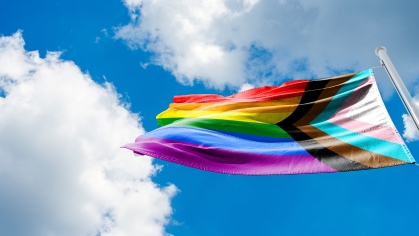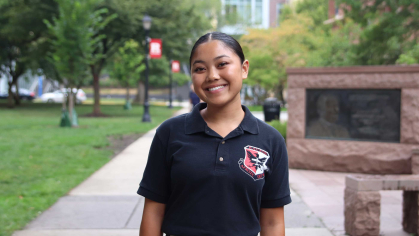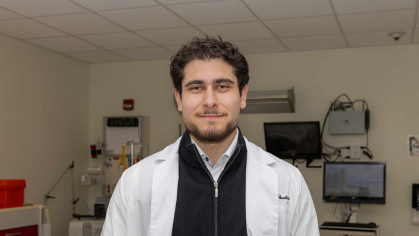Saying YES to Careers in Oncology
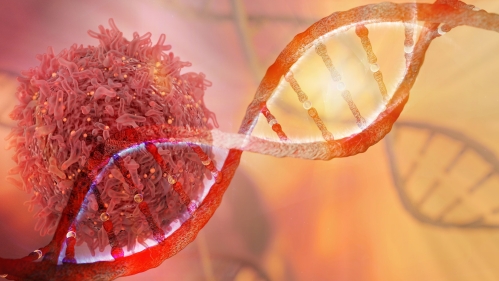
A novel training program at the Rutgers Cancer Institute aims to build the state’s medical workforce and tackle disparities in cancer treatment
In the lab of Peter Cole, a pediatric oncologist at Rutgers Cancer Institute, students barely old enough to drive are researching how chemotherapy affects the brain.
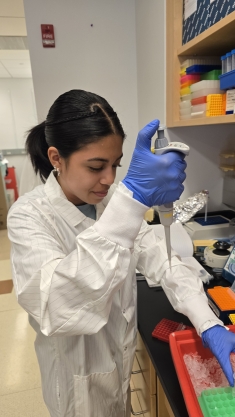
Across campus, another undergraduate in cancer epidemiologist Nur Zeinomar’s lab is leveraging his coding skills to analyze physical activity patterns among Black and Hispanic breast cancer survivors – work usually carried out by PhD students – to better understand their links to survivorship outcomes.
And earlier this year, at the American Society of Preventive Oncology’s annual meeting in Philadelphia, Rutgers senior Jonathan Julian stood before a roomful of experts to deliver a “flash talk” on mammogram access for disadvantaged women. He was one of the only undergraduates selected to present.
Opportunities like these are being made possible by the Rutgers University Youth Enjoy Science (RUYES) program, launched in 2020 to expose high school and undergraduate students – along with high school science teachers – to the world of oncology research.
The renewal of a highly competitive $1.75 million grant from the National Cancer Institute will keep that momentum going for another five years, widening opportunities for students across New Jersey.
“It thrills me to see these students so excited about science,” said Cole. “Anytime I can share my experience and support the budding science passion of a young person, it’s a win-win.”
There are communities in New Jersey that face a disproportionate burden of cancer, and most of these communities are not well represented in our oncology workforce.
Sunita Chaudhary
Director of Research Education, Rutgers Cancer Institute
Each summer, five high school students and five undergraduates are chosen from a pool of Garden State applicants to participate in a two-year research initiative, working alongside cancer scientists each summer for 10 weeks.
Four high school teachers also participate, returning to their classrooms with fresh cancer-focused lesson plans. Research projects range from studying sun protection and skin cancer trends to examining vaping’s role in lung cancer.
The program’s architect, Sunita Chaudhary, interim associate director of education and training and director of research education at the Rutgers Cancer Institute – the state’s only NCI-designated Comprehensive Cancer Center together with RWJBarnabas Health – designed it with a dual purpose: to strengthen the state’s oncology workforce and to tackle disparities in cancer treatment.
“There are communities in New Jersey that face a disproportionate burden of cancer, and most of these communities are not well represented in our oncology workforce,” Chaudhary said.
The objective of the program is to reach into these communities and attract more people who understand what cancer prevention and therapy looks like to help address disparities in cancer burden, and ultimately, to bring more young people into oncology fields.
So far, 72 participants have entered the program: 26 high schoolers, 26 undergraduates and 20 high school teachers. Early results are encouraging.
Of the 16 high schoolers to complete the program, 2 are applying to colleges, 14 went on to college, and 13 chose STEM majors at schools like Yale, Duke, the University of Pennsylvania, Johns Hopkins, Syracuse and Brown.
Anytime I can share my experience and support the budding science passion of a young person, it’s a win-win.
Peter Cole
Pediatric Oncologist
Two teachers, two undergraduates and two high school students even co-authored manuscripts submitted to peer-reviewed journals.
But placement numbers are only part of the story. Trained teachers have developed cancer-focused classroom units, reaching hundreds of students directly. Outreach by participants at their schools have engaged thousands more.
For Julian, the impact has been deeply personal. A biology and public health major at Rutgers-New Brunswick, he spent two summers in the lab of Robert Wood Johnson Medical School assistant professor Evelyn Arana researching cancer screening and cancer survivorship in Hispanic communities.
“Many families are affected by cancer, including my own, but that's not what drew me to RUYES,” Julian said. “It was really the professional development aspect that appealed to me.”
Zeinomar, too, has seen how the program can alter trajectories. One of her mentees, a student from New Jersey City University, brought coding skills honed through video games to a project assessing public health data. That experience reshaped his future.
“He recently sent me an email saying that because of my mentorship, he is considering making public health his major,” Zeinomar said. “These emails keep me going. We need people that are passionate about public health, and we absolutely need people from diverse backgrounds” to pursue careers in oncology.

